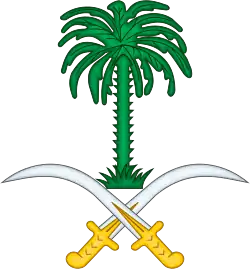Royal Saudi Air Force
The Royal Saudi Air Force (Arabic: القوات الجوية الملكية السعودية) (RSAF) is the aviation branch of the Saudi Arabian Armed Forces.
| Royal Saudi Air Force | |
|---|---|
| القوات الجوية الملكية السعودية | |
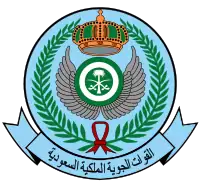 Badge of the Royal Saudi Air Force | |
| Founded | June 1920 [1] |
| Country | |
| Type | Air force |
| Role | Aerial warfare |
| Size | 63,000 personnel +844 aircraft [2] |
| Part of | Saudi Arabian Armed Forces |
| Engagements | |
| Decorations | |
| Website | Official website |
| Commanders | |
| Commander of the Air Force | Lieutenant General Turki bin Bandar Al Saud |
| Insignia | |
| Roundel | 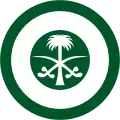 |
| Fin flash | 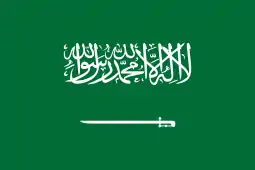 |
| Aircraft flown | |
| Attack | Panavia Tornado |
| Electronic warfare | Boeing RE-3A, Boeing E-3A |
| Fighter | Eurofighter Typhoon, F-15 Eagle |
| Reconnaissance | F-5, Tornado IDS |
| Trainer | Pilatus PC-21A, BAE Hawk |
| Transport | C-130 |
The RSAF has developed from a largely defensive military force into one with an advanced offensive capability, and maintains the third largest fleet of F-15s after the U.S. and Japanese air forces.
The backbone of the RSAF is currently the Boeing F-15 Eagle, with the Panavia Tornado also forming a major component. The Tornado and many other aircraft were delivered under the Al Yamamah contracts with British Aerospace (now BAE Systems).
The RSAF ordered various weapons in the 1990s, including Sea Eagle anti-ship missiles, laser-guided bombs and gravity bombs. Al-Salam, a successor to the Al Yamamah agreement will see 48 Eurofighter Typhoons delivered by BAE.
History
.jpg.webp)
The RSAF was formed in the mid-1920s with British assistance from the remains of the Hejaz Air Force.[4] It was initially equipped with Westland Wapiti IIA general purpose aircraft flown by pilots who had served Ali of Hejaz but had pardoned by the Saudi king.[5] It was re-organized in 1950 and began to receive American assistance from 1952 including the use of Dhahran Airfield by the United States Air Force.
Early aircraft used by the RSAF included the Caproni Ca.100, Albatros D.III, Armstrong Whitworth F.K.8, Farman MF.11 Airco DH.9, dH 82 Tiger Moth, Westland Wapiti, Avro Anson, Douglas C-47, and the B-26 Invader.
As part of the Magic Carpet arms deal between the United Kingdom and the Kingdom of Saudi Arabia, four single-seat Hawker Hunter F.6s and two Hunter T.7s were ordered from Hawker in 1966. The aircraft were delivered to No. 6 Squadron at Khamis Mushayt Airbase in May 1966. Although the Hunters were operational following attacks on Saudi Arabia by the Egyptian Air Force they were not a success as interceptors as they lacked any ground control but were used for ground attack. One single-seat aircraft was lost in 1967 and the remaining aircraft were presented to Jordan in 1968.
The Saudi forces are equipped with mainly western equipment. Main suppliers are companies in the United Kingdom and the United States of America. Both the UK and the US are involved in training programs conducted in Saudi Arabia.
During the 1980s and 1990s, by Middle Eastern standards the armed forces of Saudi Arabia were relatively small. Its strength however was derived from advanced technology. The backbone of the strike / ground attack force is formed by ca 70 Tornados (a second batch of 48 Tornado IDS were ordered in 1993 under the al-Yamamah II program), and 72 F-15S aircraft delivered from the mid-1990s that operate beside the remnants of more than 120 F-15C/D aircraft delivered starting in 1981. Pilot training is executed on the Pilatus PC-21 and BAe Hawk. The C-130 Hercules is the mainstay of the transport fleet and the Hercules is assisted by CN-235s and Raytheon King Air 350 light transports. Reconnaissance is performed by Tornadoes and F-15s equipped with the DJRP electro-optical reconnaissance pod. The Boeing E-3A is the Airborne Early Warning platform operated by No. 18 Squadron RSAF.
The VIP support fleet consists of a wide variety of civil registered aircraft such as the Airbus A330, Airbus A320, 737 and 747, Lockheed Tri-Stars, MD11s and G1159A as well as Lockheed L-100-30. The HZ- prefix used in the civilian registrations of these aircraft derived from the former name of the territory (Hejaz).
From 1989-91 three Lockheed C-130 Hercules of the RSAF were destroyed in accidents.
Purchases during the 2000s
The Al Yamamah contract was controversial because of the alleged bribes associated with its award. Nonetheless, the RSAF announced its intention to purchase the Typhoon from BAE Systems in December 2005. On 18 August 2006, a memorandum of understanding was signed for 72 aircraft in a GB£6–10 billion deal.[6]
Following this order, the investigation of the Al Yamamah contract was suppressed by the British prime minister Tony Blair in December 2006, citing "strategic interests" of the UK. On 17 September 2007 Saudi Arabia announced it had signed a £4.4bn deal with BAE Systems for 72 Typhoons.[7]
On 29 December 2011, the United States signed a $29.4 billion deal to sell 84 F-15s in the SA (Saudi Advanced) configuration. The sale includes upgrades for the older F-15s up to the SA standard and related equipment and services.[8]
On 23 May 2012, the British defence firm BAE Systems agreed to sell 22 BAE Hawk advanced jet trainer aircraft to the Royal Saudi Air Force for a total of £1.9 billion ($3 billion). The deal also included simulators, ground and training equipment and spares.[9] In April 2013, BAE Systems delivered the first two new Typhoons of 24 to Saudi Arabia.
In 2013, the USAF tendered an offer for security services to protect the Saudi air force from cyberwarfare attacks.[10]
Aircraft previously used by the RSAF
Previous aircraft flown by the Royal Saudi Air Force included the F-86F Sabre, dH 100 Vampire FB.52, BAC Strikemaster Mk 80, DHC-1 Chipmunk Mk 10, C-54A Skymaster, C-123B Provider, T-6A Texan, T-33A Shooting Star, Cessna 310, O-1 Bird Dog, T-35A Buckaroo, T-34A Mentor, OH-58A Kiowa, T-28A Trojan, F-5 Tiger II, Lockheed JetStar, dH Comet 4C (VIP transport), BAe 146, Alouette III. BAC Lightning F.52, F53 and T.55
| Aircraft | Origin | Type | Variant | In service | Notes | |
|---|---|---|---|---|---|---|
| Combat Aircraft | ||||||
| F-15 Eagle | United States | Air superiority | F-15C | 42 | ||
| Northrop F-5 | United States | Light fighter | F-5B/F/RF | 21 | ||
| Northrop F-5 | United States | Light fighter | F-5E Tiger | 53 | ||
| Panavia Tornado | United Kingdom | Multirole fighter | IDS | 25 | ||
| Panavia Tornado | United Kingdom | Interceptor | ADV | 19 | ||
| Reconnaissance Aircraft | ||||||
| Northrop F-5 | United States | Aerial reconnaissance | RF-5E Tigereye | 10 | ||
| AWACS | ||||||
| Boeing E-3 Sentry | United States | AEW | E-3A/B | 5 | ||
| Tanker | ||||||
| Boeing E-3 Sentry | United States | aerial refueling | KE-3A | 8 | ||
| KC-130 Hercules | United States | aerial refueling / transport | KC-130H | 8 | ||
| Transport | ||||||
| C-130 Hercules | United States | tactical airlift | 30 | |||
| Lockheed L-100 Hercules | United States | transport | L-100-30H | 5 | ||
| CASA C-212 Aviocar | Spain | transport | 35 | |||
| Helicopter | ||||||
| AB-205 | United States | Utility | 8 | |||
| AB-206 | United States | Utility | 206A | 13 | ||
| AB-212 | United States | Utility | 27 | |||
| CH-46 Sea Knight | United States | Utility | KV-107 | 7 | ||
| Trainers | ||||||
| F-15 Eagle | United States | Air superiority | F-15D | 15 | ||
| Northrop F-5 | United States | Conversion trainer | F-5B | 14 | ||
| BAE Systems Hawk | United Kingdom | Trainer | 29 | |||
| Pilatus PC-9 | Switzerland | Trainer | 30 | |||
| Jetstream | United Kingdom | Trainer | 1 | |||
| BAC Strikemaster | United Kingdom | Trainer | 35 | |||
Structure
The RSAF is divided into nine Wings that are dispersed across seven Air Bases:
- RSAF Wing 1 at King Khalid Air Base, Khamis Mushait
- RSAF Wing 2 at King Fahad Air Base, Taif. Listed by scramble.nl in mid-2020 as including Nos 3, 5, No. 10, 14, 34, and 80 Squadrons; plus an AB212 detachment of 12 Squadron.[12]
- RSAF Wing 3 at King Abdulaziz Air Base, Dhahran
- RSAF Wing 4 at King Khalid Military City, Hafar Al-Batin
- RSAF Wing 5 at King Khalid Air Base, Khamis Mushait. Listed by scramble.nl in mid-2020 as including Nos 6, 99, 202, and 203 Squadrons; plus 55 Squadron, the F-15 FTU, and a detachment of 14 Squadron.[12]
- RSAF Wing 6 at Prince Sultan Air Base, Al Kharj
- RSAF Wing 7 at King Faisal Air Base, Tabuk. Listed by scramble.nl in mid-2020 as including Nos 2, 21, 29, 37, 79 Squadrons; plus 88 Squadron, the "Saudi Falcons" aerobatic team.[12]
- RSAF Wing 8 at King Abdullah Air Base, Jeddah
- RSAF Wing 11 at King Abdulaziz Air Base, Dhahran
Squadrons
.jpg.webp)
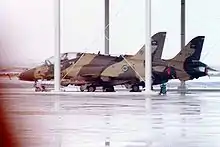
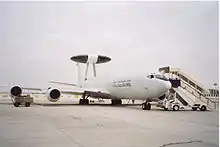
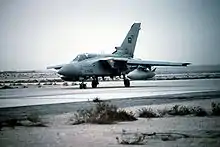
- 1 Squadron (Royal Flight/BBJ&HS125)
- 2 Squadron (F-15C And F-15D) - previously English Electric Lightning at Tabuk, up until at least 1985.[13]
- 3 Squadron (Eurofighter Typhoon)[14]
- 4 Squadron (C-130)
- 5 Squadron (F-15C And F-15D)
- 6 Squadron (F-15SA) - Seconded Pakistani pilots previously flew seven ex-RAF English Electric Lightning F Mk. 2 and T Mk. 4 aircraft from Khamis Mushayt[13]
- 7 Squadron (Tornado IDS)
- 8 Squadron (Cirrus SR22)
- 9 Squadron (PC-21)
- 10 Squadron (Eurofighter Typhoon)[14]
- 11 Squadron (Royal Flight/G-IV&CE550)
- 12 Squadron (Bell 212)
- 13 Squadron (F-15C And F-15D) - previously English Electric Lightning.[13]
- 14 Squadron (Helicopters)
- 15 Squadron (OUT SERVICE)
- 16 Squadron (C-130)
- 18 Squadron (E-3/KE-3A)
- 19 Squadron (RE-3A)
- 21 Squadron (BAE Hawk)
- 22 Squadron (PC-21)
- 24 Squadron (A330 MRTT)[15]
- 25 Squadron (Bell 412)
- 29 Squadron (Tornado ADV to be replaced with the F-15SA)
- 30 Squadron (Helicopters)
- 32 Squadron (KC-130H And KC-130J)
- 33 Squadron (Royal Medical Flight)
- 34 Squadron (F-15C And F-15D)
- 35 Squadron (Jetstream)
- 37 Squadron (BAE HAWK)
- 42 Squadron (F-15C AND F-15D)
- 44 Squadron (Bell 412)
- 55 Squadron (F-15SA)
- 66 Squadron (Tornado IDS)
- 75 Squadron (Tornado IDS)
- 79 Squadron (BAE Hawk)
- 80 Squadron (Eurofighter Typhoon)[16]
- 83 Squadron (Tornado IDS)
- 88 Squadron (Hawk)
- 92 Squadron (F-15S)[15]
- 99 Squadron (Cougar)
Current inventory
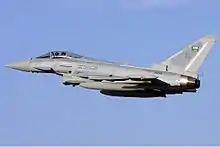
.jpg.webp)
.jpg.webp)
.png.webp)
Commanders
The following officers have been commanders of the RSAF:
- Captain Abdullah al-Mandili
- Major Rashid al-Saleh
- Major Gen. Ibrahim al-Tassan (1950–1966)
- Major Gen. Hashim bin Said Hashim (1966–1972)
- Lt. Gen. Asaad al-Zuhair (1972–1980)
- Lt. Gen. Mohammed Sabri Suleiman (1980–1984)
- Lt. Gen. Abdullah bin AbdulAziz al-Hamdan (1984–1987)
- Lt. Gen. Ahmed Ibrahim Behery (1987 – March 1996)
- Lt. Gen. Abdul Aziz bin Mohammad Al-Henadi (March 1996 – 4 April 2004)
- Lt. Gen. Prince Abdulrahman Al-Faisal (4 April 2004 – 16 June 2010)[20]
- Lt. Gen. Mohammed Al-Ayesh (16 June 2010 – 10 May 2013)[21]
- Lt. Gen. Fayyadh Al Ruwaili (10 May 2013 – 14 May 2014)[21][22]
- Lt. Gen. Muhammad Al Shaalan (14 May 2014 – 10 June 2015)[23]
- Major Gen. Mohammed al-Otaibi (10 June 2015 – 26 February 2018)[24][25][26]
- Lt. Gen. Turki bin Bandar (26 February 2018 – present)[25]
See also
- Royal Saudi Air Force Museum
- Saudi ranks
- Prince Sultan Advanced Technology Research Institute (معهد الأمير سلطان لأبحاث التقنيات المتقدمة), a Defense research and development center established by Royal Saudi Air Force and King Saud University.
References
- David Fromkin (2010). A Peace to End All Peace: The Fall of the Ottoman Empire and the Creation of the Modern Middle East. Macmillan. ISBN 978-0-8050-8809-0.
- "World Air Forces 2018". Flight Global. Archived from the original on 16 February 2019. Retrieved 19 November 2018.
- Associated Press (5 November 2009). "Saudis launches offensive against Yemen rebels". Archived from the original on 6 November 2009. Retrieved 26 March 2017.
- Reader, Bullard; Hodgkin, E. C. (1993). Two Kings in Arabia: Letters from Jeddah, 1923-5 and 1936-9. Reading: Ithaca Press. p. 101. ISBN 978-0-86372-167-0.
- al-Mutawiya, Khaled (2015). "المملكة-اليوم" [The Kingdom Today]. alyaum.com. Retrieved 11 September 2019.
- "Saudi Arabia orders Eurofighter Typhoons in up to 10 bln stg package - report - Forbes.com". Web.archive.org. 22 December 2005. Archived from the original on 10 October 2008. Retrieved 18 July 2015.
- "Business | Saudis buy Eurofighters from UK". BBC News. 17 September 2007. Retrieved 18 July 2015.
- Wolf, Jim (29 December 2011). "U.S. Saudi fighter jet sale to help offset Iran". Reuters. Archived from the original on 24 September 2015. Retrieved 18 July 2015.
- "BAE Systems and Saudi Arabia sign £1.9bn Hawk jet deal – BBC News". Bbc.co.uk. Archived from the original on 12 March 2017. Retrieved 18 July 2015.
- Reed, John (18 March 2013). "The Saudi air force wants to protect its newest planes from cyber attack". Archived from the original on 4 July 2013. Retrieved 18 March 2013.
- Cordesman, A. H., Al-Rodhan, K. R. (2006). Gulf Military Forces in an Era of Asymmetric Wars. United Kingdom: Praeger Security International. P. 208
- Scramble: Saudi Arabia, accessed August 2020.
- Orbis, "Warplane" partwork, Issue 20 (1985), p388.
- AirForces Monthly. Stamford, Lincolnshire, England: Key Publishing Ltd. February 2016. p. 74.
- AirForces Monthly. Stamford, Lincolnshire, England: Key Publishing Ltd. April 2016. p. 9.
- AirForces Monthly. Stamford, Lincolnshire, England: Key Publishing Ltd. August 2015. p. 4.
- "World Air forces 2004 pg. 83". Flightglobal Insight. 2017. Retrieved 20 June 2017.
- "World Air Forces 2020". Flightglobal Insight. 2020. Retrieved 10 February 2020.
- "World Air Forces 2020". Flightglobal Insight. 2020. Retrieved 10 February 2020.
- "King Fahd appoints Commander of Air Force – SAMIRAD (Saudi Arabia Market Information Resource)". Saudinf.com. 5 April 2004. Archived from the original on 5 March 2010. Retrieved 18 July 2015.
- Mystery surrounds death of Saudi chief of staff Archived 3 February 2017 at the Wayback Machine. Arabian Aerospace. Published 25 June 2015. Retrieved 14 May 2017.
- Saudi Lt-General Fayyadh Al-Ruwaili, new RSAF Commander Archived 10 February 2018 at the Wayback Machine. Tactical Report. Published 13 May 2013. Retrieved 14 May 2017.
- "Saudi Lt-General Mohammad Al-Shaalan, new RSAF Commander". Tacticalreport.com. Archived from the original on 26 June 2015. Retrieved 18 July 2015.
- Boeing F15-SA Fighter Jet Joins Royal Saudi Air Force Fleet Archived 28 January 2017 at the Wayback Machine. Defense World. Published 25 January 2017. Retrieved 14 May 2017.
- O'Connor, Tom (26 February 2018). Saudi Arabia Changes Government Up, Switching Top Military Leader Amid Yemen War Struggle Archived 27 February 2018 at the Wayback Machine. Newsweek. Retrieved 27 February 2018.
- Saudi Major-General Al-Ghamdi, Acting RSAF Commander Archived 22 May 2017 at the Wayback Machine. Published 24 June 2015. Retrieved 14 May 2017.
External links
| Wikimedia Commons has media related to Royal Saudi Air Force. |
- Official website
- Order of Battle at Scramble magazine
- "The Royal Saudi Air Force – A Paper Tiger, Minus the Tiger"
